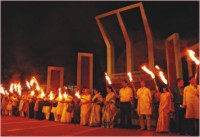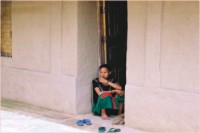
Inside
|
Editor's Note Verbally, and as part of the current national thought-process, we have moved far ahead on the question of war crimes trials than we have in terms of actually conducting them and delivering justice. In spite of the mounting moral pressure for bringing the perpetrators of rape, arson, murder in 1971 as collaborators of Pakistani occupation forces to justice, civil society's spade-work and legal experts' enlightening discourses on how to go about holding the trials, the process is just inching ahead. Of course, a law is in place, tribunal has been set up, some arrests made and investigations are on; but the trial has yet to proceed full steam ahead. Formal framing of charges and bringing prosecution and defense into a face-off and play with their complements of evidence and production of witnesses are awaited. All this is enough reason for accelerating the process to see through to its conclusion, or a substantive advancement, within the remainder of the Mohajote government's tenure. For, in reality, the long-drawn delay in initiating the trial itself owed its origin to particular military-political classes holding the reins of power for years together thriving on a virtual antithesis to the values of the Liberation War. So there are potential detractors within. None could agree more that 'a balance has to be struck between protecting fair trial rights of those accused and enactment of justice for the victims and martyrs of the War of Independence'. And in this task, it appears as a blessing in disguise that Bangladesh can derive an advantage in the delay having been incurred in initiating the process. For, many international tribunals have sprung up and gone about their work, with their experience potentially coming in handy for the International Crimes Tribunal's work in Bangladesh. In drawing a curtain over the process, we cannot be oblivious of the repeal of the Collaborators Act in December, 1975 whereby some 11,000 people who had been jailed on being accused of murder, rape, etc., were released. That is a dark wood we carry. By an association of thought, as our readers would discover reading through this issue of Forum that the Constitution guarantees right to public trial (RPT). This right and the right to information (RTI) are conceptually linked and should be operatively inextricable as well. The media's access to judicial processes would not just be mutually advantageous but also buttress transparency helping to enhance public confidence in the applied jurisprudence as a whole. Indigenous people's rights are refocused on the occasion of the 13th anniversary of the CHT peace accord. Stock-taking on implementation shows a big gap which all right-thinking people want filled in, given that implementation of CHT peace accord holds the key to ensuring civic, political, economic, cultural and social rights of the indigenous people. It is an AL government that authored the peace accord and it remains for the present one to remove the roadblocks to its full implementation.
|






